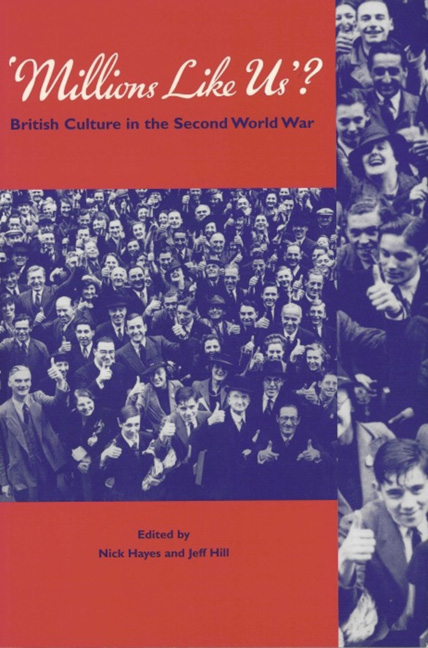Book contents
- Frontmatter
- Contents
- List of Figures and Tables
- Notes on Contributors
- Acknowledgements
- An ‘English War’, Wartime Culture and ‘Millions Like Us’
- British Cinema and ‘The People's War’
- The People's Radio: The BBC and its Audience, 1939–1945
- Was it the Mirror Wot Won it? The Development of the Tabloid Press During the Second World War
- A More Even Playing Field? Sport During and After the War
- A Time for Hard Writers: The Impact of War on Women Writers
- Safe and Sound: New Music in Wartime Britain
- More Than ‘Music-While-You-Eat’? Factory and Hostel Concerts, ‘Good Culture’ and the Workers
- ‘When Work Is Over’: Labour, Leisure and Culture in Wartime Britain
- Not Just a Case of Baths, Canteens and Rehabilitation Centres: The Second World War and the Recreational Provision of the Miners’ Welfare Commission in Coalmining Communities
- ‘You and I – All of Us Ordinary People’: Renegotiating ‘Britishness’ in Wartime
- Postscript: A War Imagined
- Index
The People's Radio: The BBC and its Audience, 1939–1945
- Frontmatter
- Contents
- List of Figures and Tables
- Notes on Contributors
- Acknowledgements
- An ‘English War’, Wartime Culture and ‘Millions Like Us’
- British Cinema and ‘The People's War’
- The People's Radio: The BBC and its Audience, 1939–1945
- Was it the Mirror Wot Won it? The Development of the Tabloid Press During the Second World War
- A More Even Playing Field? Sport During and After the War
- A Time for Hard Writers: The Impact of War on Women Writers
- Safe and Sound: New Music in Wartime Britain
- More Than ‘Music-While-You-Eat’? Factory and Hostel Concerts, ‘Good Culture’ and the Workers
- ‘When Work Is Over’: Labour, Leisure and Culture in Wartime Britain
- Not Just a Case of Baths, Canteens and Rehabilitation Centres: The Second World War and the Recreational Provision of the Miners’ Welfare Commission in Coalmining Communities
- ‘You and I – All of Us Ordinary People’: Renegotiating ‘Britishness’ in Wartime
- Postscript: A War Imagined
- Index
Summary
The story of the British Broadcasting Corporation (BBC) during the Second World War provides one of the great mythologies of wartime Britain, embodied in the image of a nation of ‘families clustered around their sets listening with reverence to speeches by Churchill, the news, or J. B. Priestley's Sunday night talks’. This image of the BBC uniting the nation around the wireless, providing the news, information and entertainment which kept the nation's morale high through bad times and good, became one of the most enduring of the war, presented at the time in newspapers, films and over the airwaves themselves, and perpetuated long after.
In many respects, of course, the evidence is compelling. The BBC nine o'clock news was heard by around 17 million people nightly throughout the war. Churchill's speeches regularly attracted 21 million listeners, Priestley's celebrated Postscripts of 1940 and 1941 10 million and ITMA 14 million. The highest percentage audience recorded during the war (and at any time by the BBC since) was 80 per cent of the adult listening audience (some 28 million), for a statement by the King on the night of D-Day. Yet, too often for historians of the war, mention of the BBC's wartime role extends little further than token references to Churchill, Priestley and ITMA. The propensity of people who lived through the war to claim they were ‘too busy to listen to the radio’ (even when closer questioning shows a quite different picture) confirms the paradox of a medium too ubiquitous to recall.
Every day throughout almost the entire war, the BBC broadcast over 30 hours of programmes of every description over two domestic services. Some programmes regularly attracted audiences of 8–10 million weekly, others barely a tenth of this. Some were simultaneously broadcast on both services, some broadcast on one and repeated on the other, but most clearly belonged on either one or the other. The conventional view of the wartime BBC is of cumulative ‘democratization’ as the BBC became more obviously responsive to listeners’ tastes.
- Type
- Chapter
- Information
- Millions Like Us?British Culture in the Second World War, pp. 62 - 92Publisher: Liverpool University PressPrint publication year: 1999

